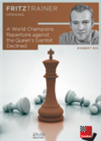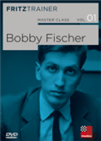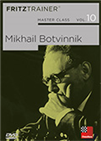Leipzig 1960 was a historic Olympiad
Leipzig is and remains a chess city. The German Chess Federation was founded there in 1877, and many strong tournaments were held there. Thirty years ago, the reunification of the two chess federations — FRG and GDR — was signed at the same place. As an eyewitness on site, we were delighted to be there at the end of September 1990; only a fortnight ago we were reminded of that day again. Today we are looking back on a chess event in the Saxon metropolis which began exactly six decades ago and can also be considered historical. From 16 October to 9 November 1960 chess followers turned their eyes to Leipzig, where the 14th Olympiad took place.
 This DVD offers a complete repertoire for handling this solid opening, often featuring a dynamic approach to pose the opponent more practical problems. Both of the main continuations 3...Nf6 and 3...Be7 are covered in two separate parts.
This DVD offers a complete repertoire for handling this solid opening, often featuring a dynamic approach to pose the opponent more practical problems. Both of the main continuations 3...Nf6 and 3...Be7 are covered in two separate parts.Max Zimmerring wrote a poem for the participants at the time:
Greeting to the masters
You came from every continent
To the fair amicable dispute.
Feel at home within our walls.
The boards of squares are ready.
On sixty-four small squares
There should be imagination, experience, spirit,
Let the art of chess prove itself
Through you, who are praised as masters.
The longer poem ended with FIDE’s motto: Gens una sumus.
The fact that an established writer was chosen to prepare the greeting message was a first indication of the significance of the Tournament of Nations. Two years after the Chess Olympiad in Munich, the young state wanted to shine with this sporting event and show that it is possible to organise such a demanding event successfully. And it succeeded impressively.
The hospitable trade city of Leipzig was indeed a suitable venue, the likes of which one could not have imagined. After all, the Olympiad lasted three and a half weeks, because there was still a preliminary and final round. And there were more than 75,000 spectators in total — which seems unthinkable today. Well, those were pre-electronic times, and the circumstances have changed drastically since then. At Chess Olympiads there have been only eleven rounds for several years, not least for reasons of cost. The participants are more or less among themselves, and the world watches on the Internet. This summer, the tournament, due to the Corona pandemic, had to take place on the Internet, which was not even seen as an emergency solution by the vast majority in the chess world. There were the imponderables of Internet transmissions, and the usual atmosphere was simply missing.
We will therefore revel in our memories of Leipzig once again and let three contemporary witnesses, among others, have their say: a grandmaster, an arbiter and a chess fanatic. Together with them we remember a great chess festival that had many highlights, including the presence of the new world champion Mikhail Tal and the Olympic debut of the young Bobby Fischer.
In 1960, the recently deceased Wolfgang Uhlmann (1935-2020) occupied the top board of the GDR team in the Ringmessehaus in Leipzig. After Moscow 1956 and Munich 1958, it was his third Olympiad. By 1990, the grandmaster from Dresden had played eleven times at the Tournament of Nations. On various occasions I have spoken to Wolfgang Uhlmann about his participations at Olympiads. He had only good memories of Leipzig 1960:

Wolfgang Uhlmann
We were proud at the time that the Olympiad was awarded to Messestadt. Leipzig hosted an Olympiad, the level of which was reached by only a few others in which I took part. The GDR wanted to shine, and no one less than the then President of the Volkskammer, Johannes Dieckmann, had assumed patronage. The enthusiasm and the crowds of spectators were immense. The Soviet Union with the new world champion Mikhail Tal showed their class. We didn’t do quite as well as we did in Munich in 1958 and ended up half a point behind West Germany. It turned out that home advantage in chess is not always beneficial. The teams in the top places were simply stronger than our team.
The exhibition “Chess in the course of time”, which was part of the Olympic supporting programme, also remained in the memory of chess players and guests from East and West. It was unique in its own way, because the precious exhibits came from all over the world. Nearly 150 cultural institutes as well as private collectors made their best pieces available in Leipzig. They impressively showed that chess belongs to the cultural heritage of mankind. The exhibition attracted an incredible number of people, including non-chess players. The international response to the exhibition was great. Well-known personalities immortalised themselves in the Golden Book of the Exposition, including world-famous violinist David Oistrach, who visited the national tournament as a passionate chess player. Many chess masters praised the exhibition as unique, among them Germany’s most famous chess collector Lothar Schmid and English team captain Harry Golombek. “This would suffice to describe the Olympiad as the most important in the history of chess”, the Briton explained at the time.
The extensive cultural programme in Leipzig was really worth seeing. Wolfgang Uhlmann later remembered the opening day fondly:
In the newly designed opera house we watched Cavalleria rusticana. The young Bobby Fischer sat next to my wife and me. The American was so preoccupied with chess in his thoughts that he slept through almost the entire performance. Shortly before, I was able to beat Fischer in a big tournament in Buenos Aires with Black out of a French Defence.
Bobby Fischer’s Olympic debut was seen in Leipzig. The 17-year-old took revenge for his loss in Buenos Aires against Uhlmann and won in a King’s Indian.

Fischer was already on his way to the top of the world rankings at that time. He was always very elegantly dressed. In Argentina, he had had five suits tailored for him and, according to the grandmaster from Dresden, he was a really likeable young man.
Wolfgang Uhlmann had married that year. His wife Christine visited him on weekends, and the GDR team resided at the Hotel Stadt Leipzig during the long tournament. Things were not as draconian there as at the Olympic Games, where women and men had to live strictly separated from each other in the athletes’ village. After the daily rounds, a lot of blitz was played in the evening, with Mikhail Tal, Tigran Petrosian and Bobby Fischer proving to be almost unbeatable according to Uhlmann’s description.
I preferred to play bridge with Efim Geller and other grandmaster colleagues, which was very popular in chess circles at the time. You could read a lot about the Olympiad in our daily newspapers. The papers were full of it, so even people who had no idea about chess were interested in the event. Names like Botvinnik, Tal or Fischer were familiar to everyone in the autumn of 1960.
The games were played on two floors of the Ringmessehauses building. The main arbiter was the then world champion in correspondence chess, Vyacheslav Ragosin from the USSR. There were 20 arbiters for the 40 participating teams, as well as two chief arbiters. At that time they had to take notes of all the games. Often the players’ scoresheets could not be deciphered. At that time there were still adjournments. After four hours of play, a gong sounded and the player in turn had to write down his move. The next morning the unfinished games continued from 9 am to 1 pm. The spectators could watch the games up close. They were only separated from the chess players by a small string and could watch their facial expressions closely.
One of those who was allowed to get very close to the players and keep some detailed memories was my friend Dieter Lentschu from Berlin.
 No other World Champion was more infamous both inside and outside the chess world than Bobby Fischer. On this DVD, a team of experts shows you the winning techniques and strategies employed by the 11th World Champion.
No other World Champion was more infamous both inside and outside the chess world than Bobby Fischer. On this DVD, a team of experts shows you the winning techniques and strategies employed by the 11th World Champion.
Grandmaster Dorian Rogozenco delves into Fischer’s openings, and retraces the development of his repertoire. What variations did Fischer play, and what sources did he use to arm himself against the best Soviet players? Mihail Marin explains Fischer’s particular style and his special strategic talent in annotated games against Spassky, Taimanov and other greats. Karsten Müller is not just a leading international endgame expert, but also a true Fischer connoisseur.
Dieter Lentschu
The now 87-year-old was an arbiter in Leipzig. He was particularly impressed by the preliminary round duel between the Austrian Karl Robatsch and Mikhail Tal. According to him, the board was on fire.
I think they both smoked about 60 cigarettes during the game! At that time, nicotine was still allowed in the game room. Each player had an ashtray on his side of the table.
In the end Robatsch and Tal shared the point, but according to the arbiter this game was even more exciting than the much-annotated encounter between Fischer and Tal, which took place later in the final round.
It was also Dieter Lentschu who captured the only defeat of world champion Tal in Leipzig, against the Englishman Jonathan Penrose. It happened in the last round and was the only zero obtained by the powerful Soviet team in this tournament.
Jonathan Penrose comes from a famous family. Almost all members were and are famous scientists. His father Lionel was a geneticist and also composed chess studies. His brother Roger Penrose received the Nobel Prize in Physics a few days ago.

Photo: Dieter Lentschu
Horst Strehlow (born 1931), a well-known chess player from Berlin, has been a friend of Dieter Lentschu for many decades. He attended the Olympiad in Leipzig with a group of chess friends. A three weeks’ stay costs money, of course, so he worked in the vegetable market in the mornings, and in the afternoon he went to follow the action at the Ringmessehaus.
It was a big deal. I saw many great games, and not only those of Fischer and Tal with the mutual sacrifices. This experience was simply unforgettable.
 Our experts show, using the games of Botvinnik, how to employ specific openings successfully, which model strategies are present in specific structures, how to find tactical solutions and rules for how to bring endings to a successful conclusion
Our experts show, using the games of Botvinnik, how to employ specific openings successfully, which model strategies are present in specific structures, how to find tactical solutions and rules for how to bring endings to a successful conclusion
Tournament book from Sportverlag Berlin
In the remarkable tournament book published by Sportverlag Berlin, there is a photograph showing Horst Strehlow as a 29-year-old kibitzing armed with a chess set. We also met him twelve years ago in Dresden. Of course the chess enthusiastic veteran was there again in 2008 as an interested spectator. But to his chagrin, the now 89-year-old did not come as close to the boards of the chess stars as in 1960. Times have changed a lot. But the veterans are still interested in current chess events.

Horst Strehlow (left) with Dieter Lentschu
The sporting outcome in Leipzig was predictable as the Soviet Union was simply too strong. As expected, the USSR team won by a large margin, because they had sent their best players: Tal, Botvinnik, Keres, Korchnoi, Smyslov and Petrosian.

Smyslov
Three of them were already world champions, one was yet to gain the title. The USA ranked second ahead of Yugoslavia. But the participation of the American grandmasters at this Olympiad was in doubt until the very end because the US State Department had initially refused to allow the team to travel to an Eastern Bloc country. The financing was not secured for a long time. A turnaround came only at the last minute after vigorous protests, in which Bobby Fischer’s mother, Regina, took part.

Uhlmann v Unzicker
The Federal Republic of Germany came 8th in Leipzig; the German Democratic Republic came 9th — in Munich 1958, a reversed order had been seen. According to Mikhail Tal, a joint German team with Wolfgang Unzicker, Wolfgang Uhlmann, Lothar Schmid and Wolfgang Pietzsch could have fought for bronze. An interesting thought. At the 1960 Summer Olympics in Rome, shortly before, there had been an all-German team that won 12 gold medals. Later, both German states went their separate ways at the “big” games until reunification — the Cold War also affected the world of sports.
The majority of chess historians believe that the GDR set new standards with its 1960 Olympiad in Leipzig. The trade city was used to receiving international guests, a clear advantage over other candidate cities. The chess federation of the GDR had already been a member of FIDE since 1950 and was given more attention by the world federation after the successful hosting of the Olympiad.
In Leipzig, there was a visible effort to respect FIDE’s motto ‘Gens una sumus’. According to a chronicler, the organizers’ attempt to keep politics and ideology as far away as possible from chess events should also be praised. However, as we can still see today, it is hardly possible to separate sport and politics. Too great is the interest of the powerful to use sport for their own purposes or to bask in the glory of successful active players. But that is a whole other issue.
Links
























